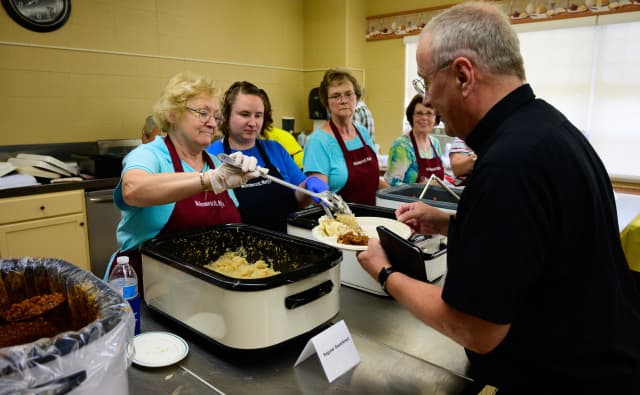BEAR CREEK, Wisconsin — Food, music and games are all essentials for a successful parish festival, but at St. Mary Parish another key ingredient is the smell and taste of sauerkraut.
Since 1965, this farming community has been home to St. Mary’s Sauerkraut Festival which is more than a parish fundraiser, say organizers and volunteers who describe the event as a gathering of lifelong friends.
“I just like the hometown feeling. Everybody from my childhood comes home,” said Barb Havnen, chairperson of the 55th annual sauerkraut festival, which took place Aug. 3 and 4. “Our little community comes together, whether they are part of our parish or not. We’ve got a lot of nonparish members up here helping. The community all pitches in and makes it a good day.”
Bear Creek is home to GLK Foods, the world’s largest producer of sauerkraut. According to GLK, it processes around 130,000 tons of cabbage a year. Sauerkraut (German for “sour cabbage”) is made by pickling finely shredded cabbage.
Norbertine Father Tim Shillcox, who was appointed pastor of St. Mary (along with St. Rose in Clintonville) in July, said the festival is “unlike anything I’ve ever been at” in previous parish assignments.
“They are tapping into their local heritage and they are so proud” of being home to the largest sauerkraut producer, he told The Compass, newspaper of the Diocese of Green Bay. “The church is 150 years old. The village is only 450 people, and this is their big fundraiser. I think last year they cleared $20,000 and they just seem to have a lot of fun doing it.”
Green Bay Auxiliary Bishop John B. Grellinger (1899-1984) seemingly had a lot of fun founding the festival just 10 weeks after being named pastor on June 18, 1965. According to “In His Vineyard 1968 to 1983: A Series of Life Sketches of the Bishops, Priests and Permanent Deacons of the Green Bay Diocese,” Grellinger started the festival as a way to pay for construction of a new school that was built in 1960 and renovation of a convent.
“Capitalizing on an area resource (‘cabbage is king’), he initiated the annual Bear Creek ‘Kraut festival’ and saw the debt disappear,” it said.
Parishioner Bill Klegin was 20 when the first festival was held. He’s volunteered at all 55 festivals and is one of its historians. “At one time, they claimed we had 3,000 people who came to our festival,” said Lorraine Bricco, who also has attended all 55 festivals and served as co-chair of the 1968 festival with her late husband, Loy.
GLK continues to support the parish festival. This year the company donated $5,000 to help pay for expenses such as a band that performed Saturday night and prizes for children’s games.
The sauerkraut festival has evolved over the years. It began as a one-day event, expanded to three days, and this year was held on a Saturday and Sunday.
Over the years, raffles, auctions, car shows, cabbage bowling, a parade and live music were added to the festival. The “famous sauerkraut festival dinner,” served Aug. 4 in the church hall, is still the main draw. Among the items served this year were hot dogs topped with seasoned or regular kraut, sauerkraut hot dish, kraut salad and kraut cupcakes.
“We served 300-plus people,” said Sue Mares, who co-chairs the festival finance committee. “We took in approximately $25,000 but the expenses have to come out of that.”
St. Mary’s Sauerkraut Festival isn’t the only such event in the country, but it is the oldest.
Many of the veteran volunteers look to the next generation to continue the event. As longtime parishioner Klegin, who is 75, said: “We’re trying to pass it on to the younger kids, because we are not getting any younger.”
He said he and fellow volunteers have been taking on festival work where they can sit more.
“We can’t run with the young folks anymore,” he added.
– – –
Lucero is news and information manager for The Compass, newspaper of the Diocese of Green Bay.
Crux is dedicated to smart, wired and independent reporting on the Vatican and worldwide Catholic Church. That kind of reporting doesn’t come cheap, and we need your support. You can help Crux by giving a small amount monthly, or with a onetime gift. Please remember, Crux is a for-profit organization, so contributions are not tax-deductible.















